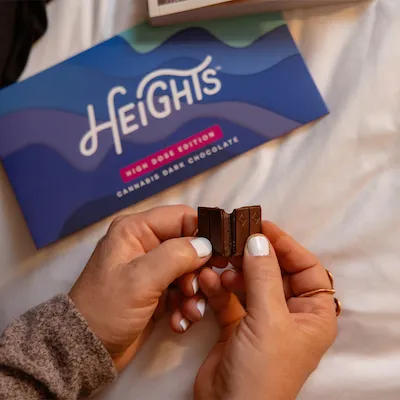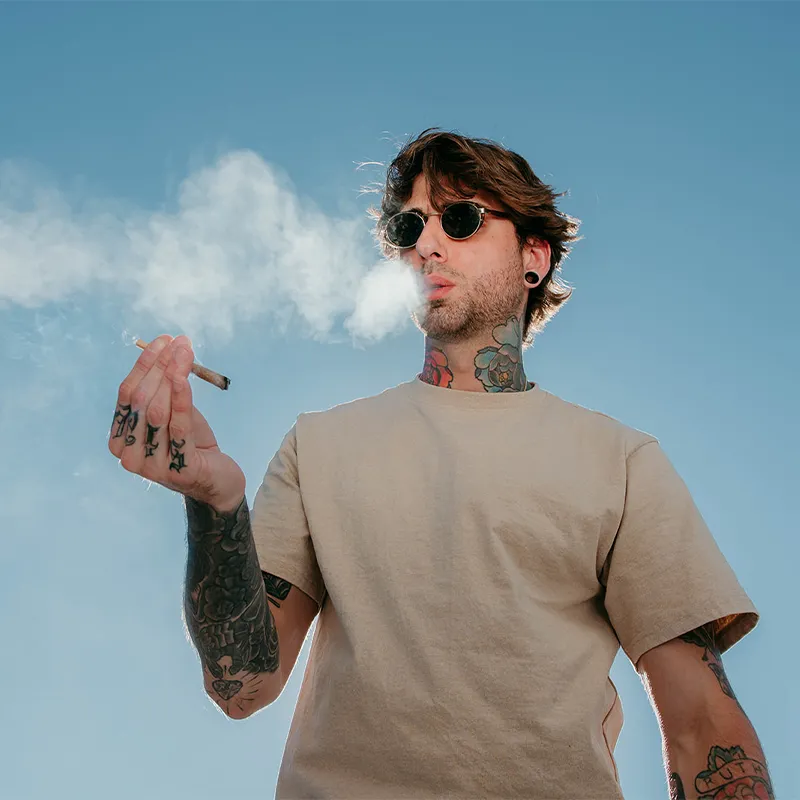A bit too much THC? Take a breath. We got you.
Whether you’re new to cannabis or a long-time toker, getting too stoned is totally normal. Maybe you’re doing your research ahead of time, or maybe you’re reading this blog because it’s happening to you right now. Either way, the most important thing to know is this: you’re going to be totally fine. As the saying goes, “this, too, shall pass.”
Let’s look at a few ways to recapture your calm and bring your body back to Earth when the weed whisks you off your feet.
Feeling Funky and Not-So Fresh
For many, being too high is an unwelcome but familiar feeling. Your heart may race, your muscles may tense up. You might feel easily overstimulated by lights and sounds, or have trouble focusing as your mind races. Dizziness, dry mouth, and paranoia can set in. These are all THC troubles that can have you teetering on a cannabis anxiety ledge. Fortunately, these are very typical cannabis effects, no matter how unpleasant. But you’re not in any danger if that’s all you’re feeling.
Time and patience are your best friends here, but let’s take a look at how this happens and a few ways to better cope with these symptoms to get you back to normal more quickly.
How The High Hits
Why do you get too stoned after a few puffs when you’ve got friends who seem to be high 24/7? Unfortunately, it’s all in how you’re built. Some users never feel cannabis overdose symptoms, but for others they can come on quickly. The best way to beat that tense, uncomfortable reaction is to know your individual tolerance. Start low, go slow, and learn when to stop.
Some factors to pay attention to that could affect your cannabis anxiety are:
Strain Potency
Pay attention to the strength of what you’re smoking. Learn what your sweet spot is for THC:CBD ratios.
Indication (Sativa, Indica, Hybrid)
Sativas are the most notorious culprits for people with lower tolerance. Try indicas and indica-leaning hybrids if you find yourself getting too high easily.
Consumption Method
Some people can vape all day, but a few joint puffs are too much. Edibles have slow onset and can trick you into over-indulging. In tinctures, a little goes a long way.
What if it’s too late? If you’re already feeling it, what do you do if you’re too high? Try these time-honored tips:
Recapture Your Calm
The key to a quick come down is a balance of body and mind. It’s important to remember that when you consume cannabis, all that’s happening is cannabinoids are bonding to receptors in your body that make you feel different ways. These can be pleasant and soothing, but they can also be intense and hard to handle.
Only time and your natural body’s processes will stop these effects, but you can better manage them to get through a bad experience, or even turn it around to a pleasant one.
Stay Calm and Breathe
Breathing exercises can help lower your heart rate and reduce your anxiety. Box Breathing is a popular and effective technique: inhale for a 4 count, hold for 4, exhale for 4, hold for 4 and repeat.
Find the Right Environment
our body and mind may find their calm in a soft bed or on the couch near friends. Maybe fresh air and a light breeze are best for you. Or try a warm shower (cold showers may increase your heart rate). If you’re in a place where you feel comfortable before consuming, odds are you’ll stay grounded when you do.
Hydrate and Eat
Drinking water can lower your heart rate and counter the effects of dry mouth. Light snacks or small healthy meals can help regulate your blood sugar which can reduce anxiety.
Find a Friend
Don’t hesitate to let a trusted friend know how you’re feeling. A simple conversation about anything else can distract your mind from anxiety, and you can feel safer knowing that someone has your back.
Avoiding More Anxiety
These common mistakes can make your symptoms worse. Practice cannabis safety by skipping these altogether:
Alcohol
Drinking alcohol can enhance the negative effects of cannabis for anyone, and it can definitely make a bad high worse. Dizziness, anxiety, dehydration, heart palpitations, and nausea are all more common when mixing weed and booze. Play it safe by never consuming cannabis and alcohol together.
Caffeine
The myth that caffeine can “sober you up” is double wrong for cannabis consumption. Caffeinated drinks can increase your heart rate and blood pressure, multiply your anxiety symptoms, and dehydrate you.
Sugary Drinks & Foods
Sugar is another substance that can shoot your heart rate up and increase your negative reactions to cannabis, so skip the soda and the sweet snacks. For some, even white breads can cause an unpleasant blood sugar spike, so stick to healthier foods like veggies and whole grains if you’ve got the munchies.
Overreacting and Panic Mode
When you’re feeling badly, it’s easy for your mind to get away from you. But remember that you’re not in any danger. Allowing yourself to panic can have a snowball effect. So keep your breathing in check, remind yourself that you are safe, and that in time, you’ll be back to feeling normal.
Stop The High in Its Tracks
The best way to beat that too-high feeling is to prevent it altogether. Above, we talked a bit about how cannabis overdose symptoms can hit you, so let’s break it down to the basics:
Know Your Strain, Know Yourself
Pay close attention to the indication of the strains your consuming (sativa, indica, hybrid). Check for that strain’s THC, CBD, and TAC levels and what the dominant terpenes are. Keep a journal of how different strains and cannabinoids make you feel. Find your own comfort zone and you can enjoy cannabis freely on your own terms.
Ask an Expert
Our staff is well trained in all things cannabis, including overindulgence and the different ways people react to different strains. Let them know if you’ve had trouble getting too high in the past, or if you’re worried about it happening. They can help you figure out the right strain, strength, and mode of consumption to keep you feeling good.
Go Easy with Edibles
Edibles have a long onset time, so it’s important to wait at least 2 hours after eating before you take a second dose. One of the most common ways people experience cannabis overdose symptoms is by taking an edible, not waiting long enough, and eating a second dose before realizing how strongly it will affect them.
When To Seek Help
While cannabis overdose symptoms are super common and generally safe, a small percentage of people may have an underlying medical condition that could be made worse by cannabis overconsumption or the anxiety and tension that comes with it. Signs that could indicate you need assistance are:
- Extreme confusion or difficulty speaking
- Chest pain
- Faintness
Having a trusted friend or loved one nearby can help ease your anxiety and get you help if it’s necessary. Remember that emergencies related to cannabis use are extremely rare, but it’s always better to be safe! If you feel in danger, call your doctor or get a ride to the nearest hospital.
Remember that our staff is here to help! Feel free to reach out to us for guidance on strains and consumption so that your experience can be pure, pleasant, and happy.
Above should not be taken as medical advice. Always consult a physician with medical questions.








.svg)

